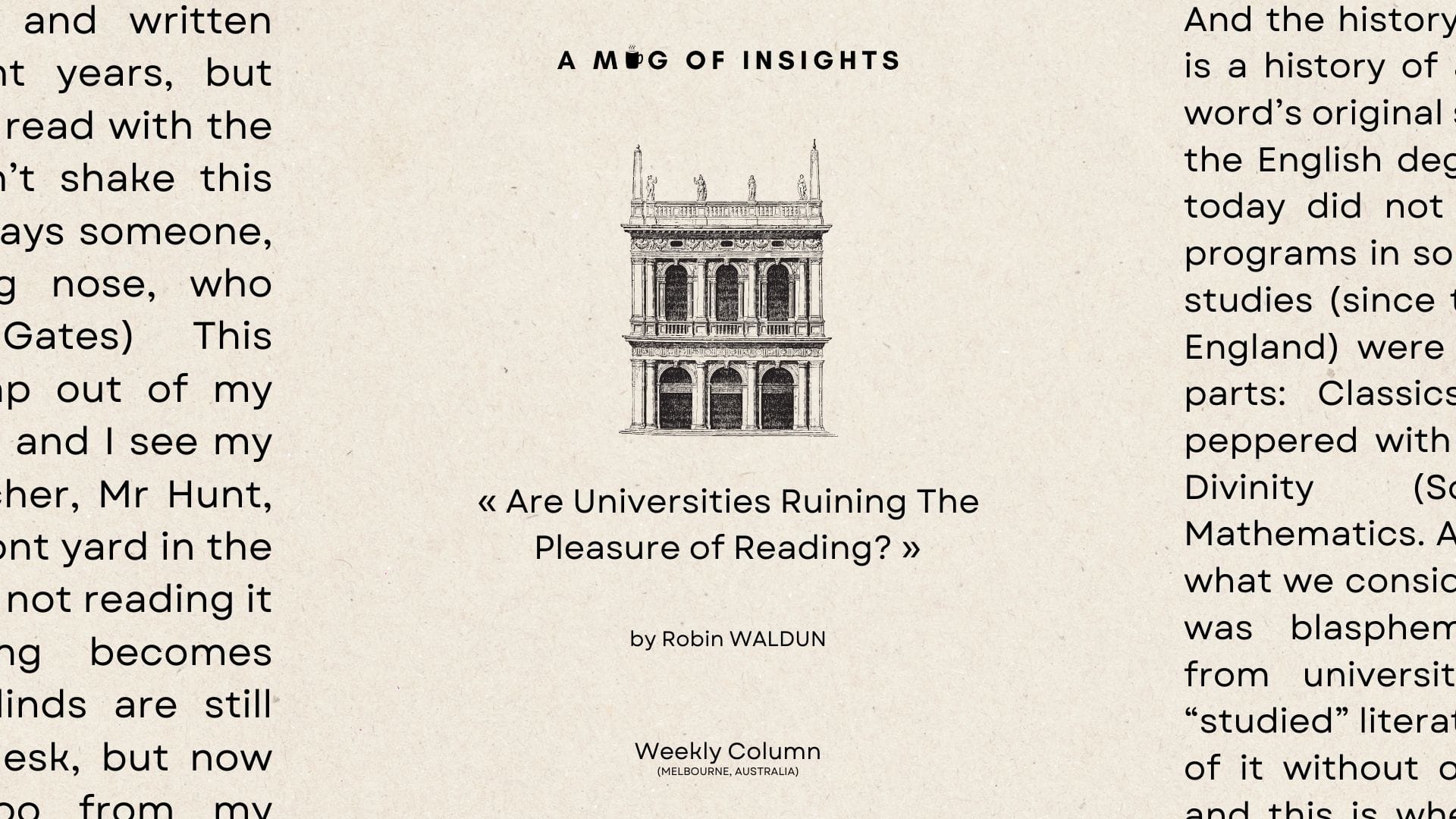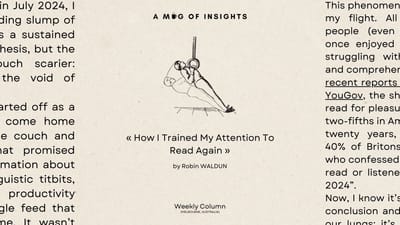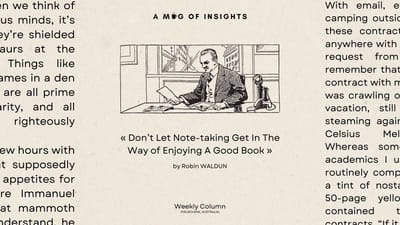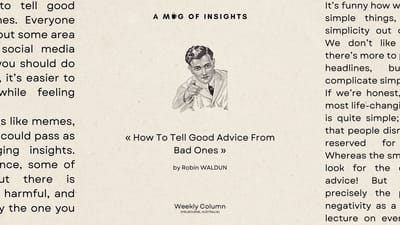Are Universities Ruining The Pleasure of Reading? - And How To Get It Back

Welcome to the weekly column from A Mug of Insights! From now on, I'll dispatch these letters on Saturdays, and paid subscribers will receive their 1-2-Read letters on Mondays. If you like what you're reading, consider upgrading to the Grande tier for journal prompts and a practical exercise every week to strengthen your reading muscles! Thank you for reading, and I look forward to seeing you next week.
I have lived, breathed and written about reading for eight years, but sometimes when I try to read with the blinds drawn, I still can’t shake this feeling, that “there’s always someone, somewhere, with a big nose, who knows…” (Cemetery Gates) This thought makes me jump out of my chair, open those blinds, and I see my high school English teacher, Mr Hunt, scurrying through the front yard in the dark, jeering: “You’re still not reading it right!” Then, everything becomes quiet. I look up: the blinds are still closed. I’m still at my desk, but now I’ve a new face tattoo from my keyboard.
These nightmares are shared by many bruised readers who swore to never pick up a book again after their first few rodeos with a subpar English teacher. Merve Emre, in her New Yorker article ‘Has Academic Ruined Literary Criticism?’ described this specific archetype as a “contemptible creature” who’s a “tyrant, a pedant, a crackpot, and a snob” He’s also a self-proclaimed “Committee-Man in the Commonwealth of letters” who is “always quacking of the infirm and diseased Parts of books”. Whether we like it or not, this voice never leaves us, and even the most competent readers have to look over their shoulders once in a while, hoping that they haven’t missed anything.
However, this voice is the most damaging to those who feel paralysed when they’re trying to give this art of reading another go. They always feel like they’re not educated enough, competent enough or smart enough to harvest something from a scary-looking book. They’re convinced that it’s doomed from the get-go because someone who studies literature will always understand it better. Well, in reality, that’s not quite true.
Literary studies’ amateur past
Nowadays, we associate amateurs with incompetent people, but if we look at the word’s etymology, amateur actually comes from the Latin root: amāre, meaning to love. So, in our attempts to condemn amateurs, we’re also erasing the love that all novices once felt for their art.
And the history of literary studies is a history of amateurism in the word’s original sense. Before 1826, the English degree as we know it today did not exist. Educational programs in so-called Humanities studies (since the Middle Ages in England) were divided into three parts: Classics (Latin & Greek peppered with a bit of rhetoric), Divinity (Scriptures) and Mathematics. And in fact, most of what we consider literature today was blasphemous and barred from universities. Most people “studied” literature out of the love of it without official credentials, and this is where the form belle lettre (a form that focused on aesthetic qualities of literary works instead of their practical/rhetorical value) gathered momentum as an antithesis to the strict curriculum of rhetoric, ancient languages and divinity. And as a result, literature was picked up by a group of amateurs we now know as the original literary critics.
As John Guillory noted in Professing Criticism, critics during the 19th Century did their work in the “periodical public sphere” as they wielded great influence and visibility “without depending upon academic credentials”. And their goal wasn’t at all to seek a stamp of approval from the academies, but to represent the common reader. In a way, they were true amateurs, driven by nothing more than an “expertise that was self-authorized” out of their love for reading. They’ve mastered the public by “creating their public”.
But what changed? You might wonder. Nowadays, even the thought of capital L, Literature brings up dread and reeks of a musty scent of tweed drenched in rain. Even for those who are courageous enough to read it, we always walk away thinking that we’re not professional enough to understand it. In a sense, we’re afraid to be an amateur, and this fear can be traced back to an important development in the 19th Century.
John Guillory explained that around the 19th Century, the professional society started to emerge where “occupations aspiring to professional status sought to institutionalise professional training in the university”, and literary studies at the time also fell prey to this professional instinct. Departments opened up where the spirit of the amateur critic was formalised into methods of analysis. Texts that were once barred from universities turned into samples to train students to become professional readers. This opened a chasm between the common reader and scholars, and literary criticism emerged as a distinct discipline that fused “the nineteenth-century identity of the critic with the professional identity of the twentieth-century scholar”. Hence, this departure from amateurism is how literary studies acquired its reputation for being impenetrable, obscure and only meant for professional readers.
When literary criticism ran out of steam
Though we are, in some ways, still living through the legacy of professional criticism, cracks are starting to show. Just like a cab driver who learned to hate driving, professional readers always find themselves returning to a thorny question again and again: are we losing the pleasure of reading because we’ve professionalised it so much? In other words, we can try as hard as we can to erase literary studies’ amateur past, but it’ll eventually return in surprising ways.
If you dig into the research on literary theory, you’ll find that the discipline is an ever-evolving attempt to legitimise itself. In the 60s, it disguised itself under critique. In the 80s, it aligned itself with progressive social causes. And at the start of the 21st Century, movements like post-critique and new aestheticism sought to revive what enchanted us about reading in the first place. But again, all of these are attempts to elevate Literature above the common reader to attain a professional status, without realising that lay readers held the key to this problem all along.
Yes, by lay reader, I mean people like us. It’s your siblings and your uncle who yawn at the very thought of anything highbrow. It’s the ones who just love to read for the sake of it, the true amateurs. If we grasp that people just like us are responsible for literature’s past and future, then that opens up a host of new possibilities.
Since literature was once an amateur pursuit, it will always have an amateur essence. This means that sometimes the best way to start reading them is to approach them like a total beginner: give it all you have with all the love you can muster. Yes, challenges will arise. Yes, certain parts will be difficult. But amateurs will always find a way. We will discuss them in public. We will come up with new ways to extract new conclusions from these books, but one thing we cannot, and should not do, is to throw up our hands and say: those dinosaurs at the academy will take care of it. This is how literacy dies, and it’ll be in the hands of those who wish to monopolise the right to read.
And all this is my reason for why I do what I do: to educate, to inspire and to remain an amateur for as long as we still have access to books. In short, this fight for literacy is only possible if we put aside a professional reader’s pride and start making sure that anyone, anywhere, gets a taste for the magic of reading with a smile on their face.
Until next week
Robin
Get a free email course with 7 proven techniques to improve comprehension, retain what you read, and engage more thoughtfully with any book:




Member discussion